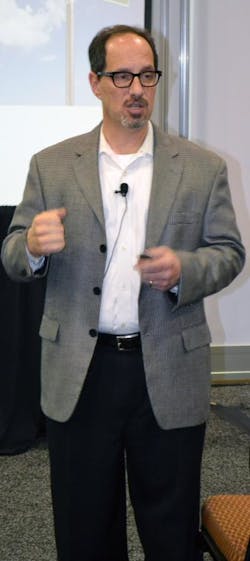Building the Next Generation of Leaders in HVACR Contracting
One of the greatest challenges of building future leaders, is finding them in the present. For an HVACR contractor, spotting them in everyday operations isn't as easy as it may seem.
Leaders avail themselves in different sways and at different times. Being able to pick out leadership traits and spot the rising star takes experience. It takes intuition and perhaps a "sixth sense" to know who will work out, and who just plain won't.
"Leadership is not about titles or flowcharts," says Josh Kahn, vice president of Kahn Mechanical Contractors in Dallas, Tx., the 2008 ContractingBusiness.com Commercial Contractor of the Year.
"Leadership is earned by those who have impact and influence on others. We spot folks on our team who rise up, when we are trudging through the rough spots," Kahn says.
Spotting indicators that the candidate you're looking at is positive, able to take on challenges, and can get things done, is a best practice.
Right Time?
Identifying the right candidate is one thing. But are they ready? Rising to the next level can be where they bloom, or it could be the level that you and they discover their weakness.
It can be a different and sometimes difficult challenge to know if the particular person you have in mind is mature enough — both emotionally and mentally. Sometimes a bright young hard charger is almost there, appears to be there, but is lacking something - and that something may develop in time. Knowing that their time has come just may be intuitive. When they're right, you know it.
"Our industry depends upon the strength and energy of many young people," says Josh Kahn. "Millennials are the fuel for our fire. Our challenge is harnessing the energy of youth, and matching it with the mentorship of experience,"
Kahn adds that he has seen fine partners vanish, mostly because adequate pathways to leadership and responsibility did not exist.
We must find our agility, if we hope to retain energetic talent. We must release some of our old ways of assessing talent, and our passion for status quo management." — Josh Kahn
"We consoled ourselves by saying 'that young man was not as ready as he thought he was,” says Kahn. "Unfortunately, the truth is we could not match our mentorship speed with the growth desire of the lost leader. I believe we must find our agility, if we hope to retain energetic talent. We must release some of our old ways of assessing talent, and our passion for status quo management. Sure, we all paid our dues through hard work, and these young kids should show more respect. However, younger partners possess elasticity of thought, instant access to information, thirst for knowledge, problem solving ability, and pure energetic passion. We have a good deal to learn about leading, and young people will require patience with us as we learn to mentor them."
The Positivity Driver
Balancing skill sets against accomplishments is important. But spotting indicators that the candidate you're looking at is positive, able to take on challenges, and can get things done, is a best practice.
"One of our oldest sayings is 'the new leader needs to have half the skills, and a history of success," says Steve Saunders, CEO of Tempo Mechanical in Irving, Texas the 2003 ContractingBusiness.com Residential HVAC Contractor of the Year. Saunders was inducted into the Contracting Business HVAC Hall of Fame in 2014.
"I think that may be less important today than it used to be. Today, I would lean towards the willingness to assume responsibility for failure and the ability to share the responsibility for successes among all who participated. Understanding the processes involved is extremely important. Being willing to risk it all to do what is right for the customer, the employee, and the situation. I particularly like it when a leader has learned how to disagree with more senior leaders, or with what might be the standard company position. This takes courage of conviction and the ability to see the impact of current efforts and the value of change. It takes the willingness to stand alone."
I particularly like it when a leader has learned how to disagree with more senior leaders, or with what might be the standard company position.
— Steve Saunders
Leaders separate themselves with their performance, by doing whatever it takes to accomplish the mission or find a way,no matter what," says Tom Casey, Chief Quality Officer with Climate Partners in Milford, Connecticut. Climate Partners has won multiple ContractingBusiness.com Quality Home Comfort Awards, and that's in part due to his team of leaders. He looks for a "can-do" attitude and a person's willingness to take responsibility without excuses. In addition, he says, their ability to look for and find solutions to problems is key.
Finding the Diamonds
When it comes to actually promote someone into the leadership ranks of the company, sometimes it comes down to intuition, but other times methodical tools can be used to assess and gather more objective evidence about the person's cognitive outlook rather than rely solely on how they act and present themselves to you.
Saunders says at Tempo Mechanical, they actually conduct a personality profile using an Industrial Psychologist to assess personality traits.
"We have been using Profiles since 1992 to do a better job of understanding all of our people and how they might interact with each other and how the profile evaluates them against the population at large on 10 different factors," Saunders explains.
It would not be good to take a great performer, and burn them out by trying to bring them along too fast, and ultimately losing their contribution in areas where they excel." — Tom Casey
But Saunders emphasizes the importance of distinguishing between someone who is zealous and makes many proclamations, and actual actions that demonstrate a person's ability to act and get things done.
"I am watching for the differences between talk and action. I am looking for results, of course," he says. "But, I am not always looking for immediate results. Sometimes, the results are about direction. I have an interest in short term outcomes. But for more senior positions, I am particularly interested in how our potential leaders think their actions will impact the future."
Tom Casey cautions that you make sure the person is interested in the next level. Many are content where they are and have no desire to take on a leadership role. This is true for many ambitious and capable professionals. Accept that this is their choice and isn't necessarily a negative; it's them being honest about their career path.
Casey advises looking at their personality against the best practices for the position to discover positives, but also where that person may need work and development and if you're able to provide it.
Finding, developing and promoting leaders depend as much on those who select them as it does on the candidates themselves. What's needed is a 'sixth sense' for identifying potential talent.
"It's always a good idea to take progressive steps, and avoid promoting a potential leader too quickly to the point of incompetence," says Casey. "It would not be good to take a great performer, and burn them out by trying to bring them along too fast, and ultimately losing their contribution in areas where they excel."
Finding, developing and promoting leaders depend as much on those who select them as it does on the candidates themselves. What's needed is a "sixth sense" for identifying potential talent.
But without that extra, talent-spotting power, putting thought into what kind of person you need is critical. Good salesperson and good communicator? Good technician? Can weather a storm and deal with a tough local business climate? There are so many different factors and characteristics of the finished leader - that is suitable for your business, in your environment, with your circumstances. Know what traits are most likely to not disappoint.
"We are fortunate to have many such partners," says Josh Kahn. "These are the folks who always want to be in the game - when we are down to wire on a deadline, when the job is harder than we expected, when we are over budget and out of ideas, when cooperation is at a low point. We count on leadership and clear vision to help us navigate these difficult days. The folks who step up first, and stay to the end, are the very people we count first for advancement into the title."
Jim Romeo (www.JimRomeo.net) is a freelance writer based in Chesapeake, Virginia. He focuses on business and technology topics.



